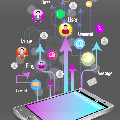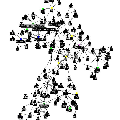Underlying relationships among Multi-Agent Systems (MAS) in hazardous scenarios can be represented as Game-theoretic models. This paper proposes a new hierarchical network-based model called Game-theoretic Utility Tree (GUT), which decomposes high-level strategies into executable low-level actions for cooperative MAS decisions. It combines with a new payoff measure based on agent needs for real-time strategy games. We present an Explore game domain, where we measure the performance of MAS achieving tasks from the perspective of balancing the success probability and system costs. We evaluate the GUT approach against state-of-the-art methods that greedily rely on rewards of the composite actions. Conclusive results on extensive numerical simulations indicate that GUT can organize more complex relationships among MAS cooperation, helping the group achieve challenging tasks with lower costs and higher winning rates. Furthermore, we demonstrated the applicability of the GUT using the simulator-hardware testbed - Robotarium. The performances verified the effectiveness of the GUT in the real robot application and validated that the GUT could effectively organize MAS cooperation strategies, helping the group with fewer advantages achieve higher performance.
翻译:在危险场景中,多智能体系统 (MAS) 之间的潜在关系可以用游戏理论模型表示。本文提出了一种新的基于网络的层次化模型,称为游戏理论效用树 (GUT),它将高层策略分解为可执行的低层动作,以实现协作 MAS 的决策。它与基于智能体需求的新报酬度量相结合,用于实时战略游戏。我们提出了一个探索游戏环境,从成功概率和系统代价的角度衡量了 MAS 完成任务的表现。我们将 GUT 方法与贪婪依赖复合行动的最先进方法进行评估。广泛的数值模拟结果显示,GUT 可以组织更复杂的 MAS 协作关系,以更低的成本和更高的胜率帮助群体完成具有挑战性的任务。此外,我们还通过仿真器-硬件测试平台 Robotarium,证明了 GUT 的适用性。性能验证了 GUT 在实际机器人应用中的有效性,验证了 GUT 能够有效地组织 MAS 协作策略,帮助较弱的群体获得更高的性能。



